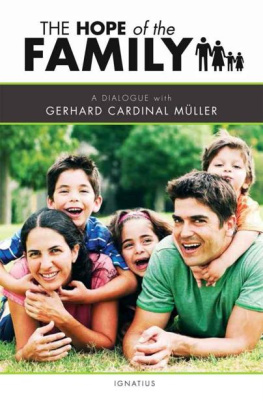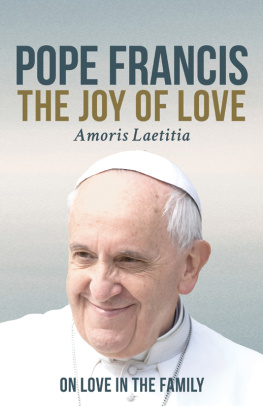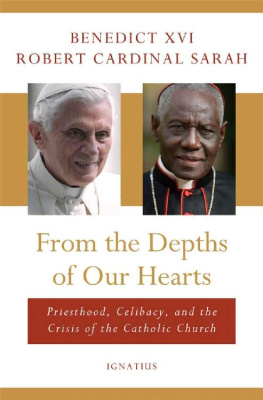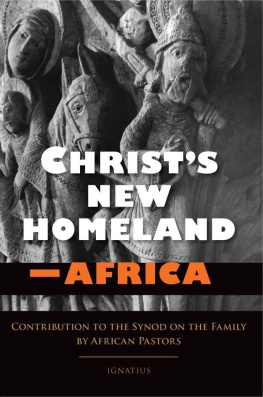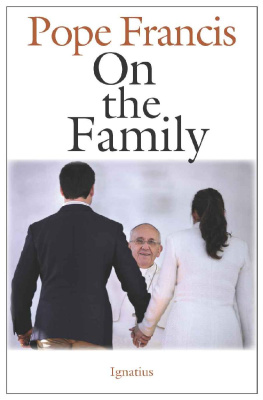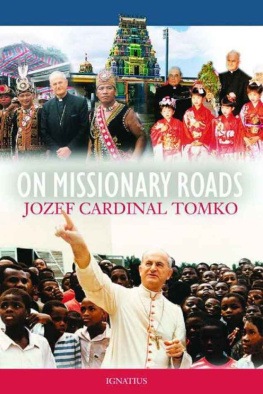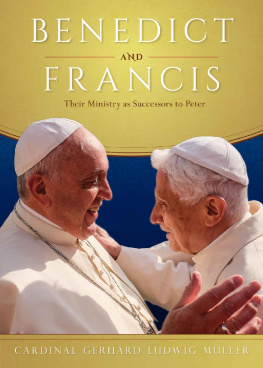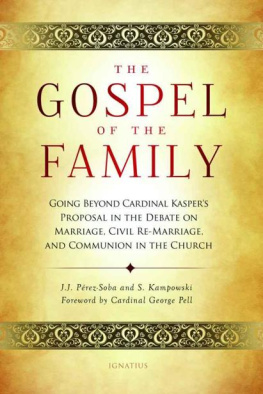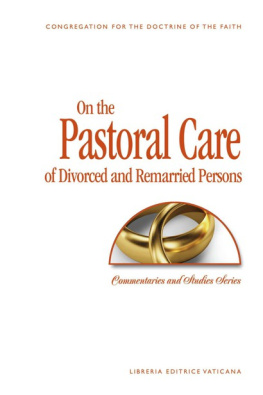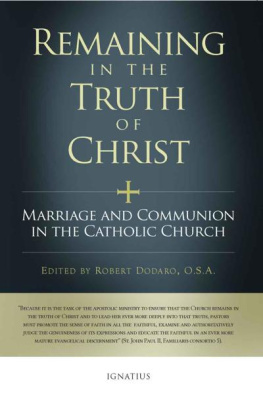THE HOPE
OF THE FAMILY
THE HOPE
OF THE FAMILY
Dialogue with
Gerhard Cardinal Mller
Edited by Carlos Granados
Translated by Michael J. Miller
IGNATIUS PRESS SAN FRANCISCO
Original Spanish title:
La esperanza de la familia: Dilogo con el
Cardenal Gerhard-Ludwig Mller
2014 by Biblioteca de Autores Cristianos (BAC),
Madrid, Spain
Cover photo:
get4net/pond5.com
Cover design by Enrique Javier Aguilar Pinto
2014 by Ignatius Press, San Francisco
All rights reserved
ISBN 978-1-62164-002-8
Library of Congress Control Number 2014946453
Printed in the United States of America
CONTENTS
INTRODUCTION
We must thank BAC (Biblioteca de Autores Cristianos) for publishing this interview. It is to Cardinal Mller, however, that we owe our special thanks for the clarity with which he expressed himself about the problems that currently affect the Christian family.
The question about the participation of divorced and remarried Catholics in the sacraments will oblige us to rethink as a whole the place of the Sacrament of Matrimony in our Churches and, more broadly, the authenticity of the process of Christian initiation of our young people.
The sacraments are celebrations of faith in which the faith of believers blends with the traditional and communal faith of the Church. In the Sacrament of Matrimony, the Christian faithful, a man and a woman, celebrate with the Church their faith in the love of God that is present and at work in them as members of the Church and coworkers of God in the multiplication of new members for mankind and for the Church of salvation.
Although there were times in which we could take the faith for granted, today we cannot, because we live in times of secularization and unbelief. We cannot ignore the existence of baptized persons who have no faith, who do not accept in its entirety the Christian view of marriage and family.
The main problem that we have in the Church concerning the family is not the small number of divorced and remarried persons who wish to approach the Eucharist in Holy Communion. The more serious problem that we have is the large number of baptized persons who marry civilly and the large number of baptized and sacramentally married persons who do not celebrate their wedding ceremony or live out their married life in accordance with Christian life and the teachings of the Church, as living icons of Christs love for his Church, which is present and active in the world. Therefore, in our world, preparation for the Sacrament of Matrimony begins with the Christian conversion of adolescents and the religious and moral formation of young men and women.
It is possible that reading this little book will not be easy for some persons. Priests and Christian educators will do well to read it slowly and attentively and to reflect carefully on all that it contains. In it, Cardinal Mller gives us ideas and suggestions to help us reconsider, calmly and in depth, these questions within our tradition and the communion of the Church. With it, he does us a great service.
Madrid, June 29, 2014 Solemnity of Saint Peter and Saint Paul
Cardinal Fernando Sebastian
Archbishop Emeritus of Pamplona
Bishop Emeritus of Tudela
PREFACE BY THE EDITOR
The hope of the family. The possessive case gives rise to various interpretations: a hope for the family, a hope that is based on the family, or even a hope that is the family itself. The purpose of this little book is to address the question that the Holy Father posed by convoking an Extraordinary Synod on the Family scheduled for October 2014, the question of the pastoral challenges of the family. In order to do this, we have tried to travel a path by means of the questions we have posed to the cardinal prefect of the Congregation for the Doctrine of the Faith: the pathway of hope and not, primarily, the pathway of problems. The family, we might say, is in the first place the solution, not the problem. Hence the title selected refers to the fact that the family, the domestic church, is a source of hope and that it clearly needs to be strengthened in its mission, in other words, to go back to remembering what it is: Family, be what you are.
The cardinal prefect of the CDF, Gerhard Mller, welcomed the idea of a dialogue about the family. The text basically compiles what emerged from the dialogue that the editorin-chief of BAC, Father Carlos Granados, had with His Eminence in his office at the Congregation for the Doctrine of the Faith last month, in June 2014. The text was then revised by the latter. The question about the family arose and was formulated, obviously, within the context of the upcoming synod on the family. But it needed to be placed also in a wider context, in which the urgent questions do not obscure the background and the depth of the topic.
The idea of this dialogue sprang from a pastoral concern to make more comprehensible to the Christian faithful the meaning of what is heard and remarked these days about the upcoming synod (often in the media with little real information). The words of the prefect of the Congregation for the Doctrine of the Faith illuminate the framework within which todays questions about the family emerge; an attentive reading of them will make clear that the faith is the true light that brings the problems back to their true center.
The BAC wishes to thank Cardinal Mller for approving our project, for the trust that he showed at every moment, and for taking the time to conduct the interview and then to revise the text in its entirety.
Carlos Granados, Editor-in-chief
Biblioteca de Autores Cristianos
Dialogue with
Gerhard Cardinal Mller
Question: With enormous clear-sightedness, Pope Francis convoked an extraordinary synod on the family entitled Pastoral Challenges of the Family in the Context of Evangelization. This is a real opportunity to address the challenges that our contemporary world poses to the family. What are these challenges? The first challenge seems to be the fact that young people no longer marry. There are those who say that this will be the real challenge for the synod on the family. In a romantic society, characterized by individuals who are extremely fragile emotionally, the trustworthiness of love has been called into question, and with it the value of the promise of forever. Young people who face marriage encounter difficulties as they try to believe in love. Love has become so fluid that it seems to have little strength to serve as a serious basis for planning a family. Young engaged couples, in fact, find it hard to believe in the soundness of the institution: What message should we convey to them? How can we foster hope in young people ?
Cardinal Mller : It is obvious that the challenges posed by todays highly secularized world are enormous. On the one hand, in some traditionally Christian countries, we observe a progressive loss of the sense of the faith. At the same time, in many other places, the Christian religion has been reduced to a set of values, ideas, or social activities, thus losing what is essential and basic in the faith experience: the real encounter with Jesus Christ, the Son of God, and the total renewal of man in an eschatological perspective. Specifically, Christian marriage as a sacrament can be understood in its true significance only when approached from a christological and eschatological point of view.
Marriage is not simply living together with another person: it is a definitive decision within the framework of the relationship of Jesus Christ, the Bridegroom, with his Bride, the Church. As Pope Francis says so appropriately in his apostolic exhortation Evangelii gaudium , inventing a Spanish neologism, Christ primerea ; he goes ahead of us and gets there first. From the creation of the world, God wished to say in Christ that his decision with regard to us, his children, was definitive and radical. That is why God willed that marriage should be this intimate, exclusive union between one man and one woman: this union is the source from which the family emerges and the criterion by which to appreciate it. In this regard, the Holy Father recently said that all marriages are ordered and inherently tend to be fruitful: children have their origin in spousal love. In his homily at the morning Mass celebrated in the chapel of Casa Santa Marta on June 2, the pope also recalled with some humor a contemporary situation that has a terribly tragic side: we mean the many couples who, instead of having children, prefer to keep a dog, a cat, or some other pet. Because they act this way, many married couples renounce the personal reciprocity that gives rise to the relationship with children, which is the fulfillment and the perfection of the conjugal love they profess.
Next page
